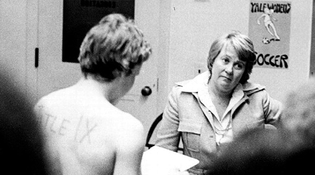
Nina Haight ’79/Yale Daily News
Joni Barnett helped get women’s sports started at Yale, but she’s often remembered as the target of a historic 1976 protest against unequal treatment.
View full image
The admission of women to Yale College in 1969 promoted greater equality in university appointments. Among the most significant was the hiring of Joni Barnett as director of physical education in 1973, a year after Congress passed Title IX of the Education Amendments of 1972. Barnett is said to have been the first woman named to such a position at a coed American university.
Yale had first hired Barnett in 1969 as coach for synchronized swimming, the sport she coached at Southern Connecticut State College. Educated in the Midwest, she had earned collegiate medals in gymnastics and synchronized swimming.
In her new position, she was more interested in physical education for women than developing varsity sports. But she went to work on behalf of varsity teams: when she found there were no uniforms for women’s field hockey, she arranged to borrow uniforms from Southern until they had their own. In the fall of 1972, when field hockey became a varsity sport, she congratulated the team and provided each member with the traditional varsity letter sweater. From 1971 to 1977, the women’s athletic budget expanded from $6,000 to $600,000, and by the time she left the job in 1979, Yale was offering 13 varsity sports for female athletes.
Barnett’s role at the newly coed university caught the public fancy, and she became a minor celebrity in the 1970s, appearing on the TV game shows What’s My Line, To Tell the Truth, and I’ve Got A Secret. But she is also remembered as an unwitting participant in a historic Yale protest.
Anne Gardner Perkins ’81 described the event in her book Yale Needs Women: “In 1976, the Yale women’s crew team, denied basic facilities, staged a naked protest, in the athletic director’s office, an event that ESPN dubbed ‘the Boston Tea Party of Title IX.’” The women removed their sweats in front of a shaken Barnett. Across the top of their chests and on their backs, the women had lettered “TITLE IX,” in protest of the fact that they were denied use of showers at the boathouse in Derby and had to wait on a bus, cold and wet, to return to campus for a shower.
A Yale Daily News reporter had been standing in a corner, eyes averted. He brought the news to the university community and to the New York Times, and, in turn, to Yale alumni. Five days later, the Derby Zoning Board of Appeals approved a permit to hook up a temporary trailer with women’s showers. A few weeks into the 1977 spring season, a $250,000 addition to the boathouse was completed, including a women’s locker room, showers, and separate boat storage bay.
In 1979 Barnett was appointed associate director of athletics for physical education and recreation. In 1983 she was appointed director of Yale’s Office of Community and State Relations, a position she held until her retirement. When President Richard Levin ’74PhD took office in 1993 with a vow to make community relations a top priority, he cited Barnett, saying, “It was Joni who paved the way for all of us.” She continued to be active in leadership roles with the Connecticut Special Olympics Summer Games and the President’s Council on Physical Fitness. In 1998 Barnett was awarded Yale’s Kiphuth Medal. Barnett died in 2015 at age 84.
In 2018, President Peter Salovey ’86PhD noted that “Yale women compete in 18 varsity sports as well as on intramural and club teams; have won 32 team national championships and captured 72 Ivy League team titles, in addition to 18 titles in the Ivy Classics (for gymnastics) and Ivy Regattas (for sailing). Yet significant challenges remain, including the underrepresentation of women and people of color in college coaching positions nationwide. The work begun by the pioneers of college sports continues.”
 loading
loading